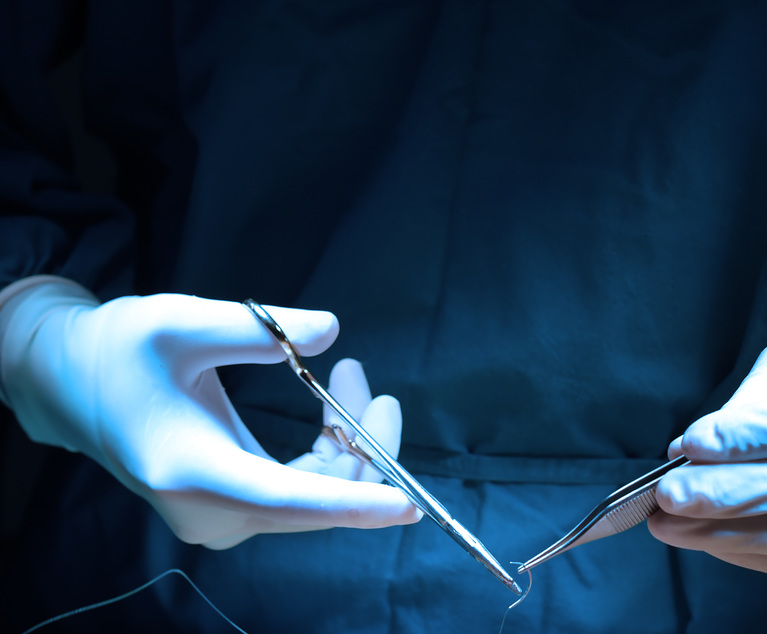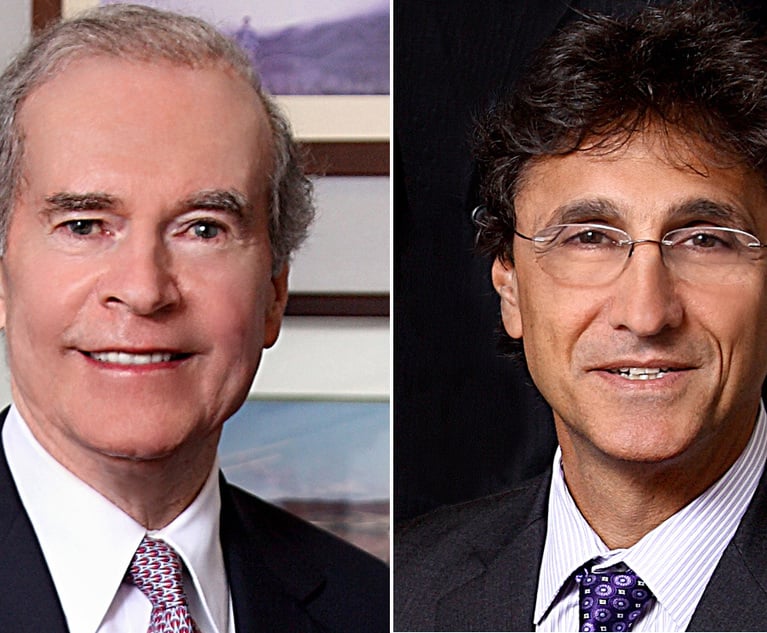 Credit: Adobe Stock
Credit: Adobe Stock Litigating Merit in Malpractice Cases
The opportunity to dispute merit in medical malpractice defense provides an important tool for the representation of your client.
November 14, 2022 at 11:05 AM
8 minute read
The opportunity to dispute merit in medical malpractice defense provides an important tool for the representation of your client. The liberal notice pleading and lenient approach to the content of bills of particulars which prevail in New York practice are such that ill-developed and speculative claims are almost impossible to weed out before the conclusion of discovery. The inefficiency of this approach frequently requires years of discovery within the poorly articulated and practically limitless bounds of the pleadings, before the court has the ability to address the sufficiency of the allegations. When the time arrives, the defense has to be ready.
At infrequent intervals which defense counsel must be ready to seize upon, the court will require that plaintiff demonstrate merit to the underlying claims in order to move forward. The simplest situation involves the case which is stricken from the calendar to be restored on motion. Pursuant to CPLR Rule 3404, the motion must be made within a year, or plaintiff's counsel must then overcome the presumption of abandonment in moving to vacate the dismissal and restore the case to the calendar. Friedberg v. Bay Ridge Orthopedic Assoc., 122 A.D.2d 194 (2d Dept. 1986). With either motion, plaintiff is obligated to establish a meritorious claim. By uniform court decisions, this requires support of a medical expert. The quality of that support is pivotal, in that the expert affidavit must not be conclusory but must carry evidentiary weight. The physician's affidavit must specify which acts of the particular defendant constituted departures from the standard of care, and how those acts caused the patient's injuries. DeRosario v. NYCHHC, 22 A.D.3d 270 (1st Dept. 2005), Wulster v. Rubenstein, 126 A.D.2d 545 (2d Dept. 1987). No quantity of deposition testimony or medical records will suffice to establish merit in the absence of the sworn statement of an expert who makes specific observations as to the treatment performed and how the alleged improprieties caused the claimed injury. Nepomniaschi v. Goldstein, 182 A.D.2d 743 (2d Dept. 1992). Along with the other requirements of support for the motion, this affidavit must be authored by an expert whose credentials would support trial testimony. Iazzetta v. Vicenzi, 243 A.D.2d 540 (2d Dept. 1997).
This content has been archived. It is available through our partners, LexisNexis® and Bloomberg Law.
To view this content, please continue to their sites.
Not a Lexis Subscriber?
Subscribe Now
Not a Bloomberg Law Subscriber?
Subscribe Now
NOT FOR REPRINT
© 2025 ALM Global, LLC, All Rights Reserved. Request academic re-use from www.copyright.com. All other uses, submit a request to [email protected]. For more information visit Asset & Logo Licensing.
You Might Like
View All


CPLR Article 16 Apportionment And Dismissed Defendants Medical Malpractice
14 minute read
Trending Stories
- 1New York Judge Steps Down After Conviction for Intoxicated Driving
- 2Keys to Maximizing Efficiency (and Vibes) When Navigating International Trade Compliance Crosschecks
- 3Houston Law Firm Files $250K Breach of Contract Suit Against 2 Former Lawyers
- 4The Week in Data Feb. 3: A Look at Legal Industry Trends by the Numbers
- 5Mass Tort Cases: Challenges for Plaintiff’s and Defense Counsel
Who Got The Work
J. Brugh Lower of Gibbons has entered an appearance for industrial equipment supplier Devco Corporation in a pending trademark infringement lawsuit. The suit, accusing the defendant of selling knock-off Graco products, was filed Dec. 18 in New Jersey District Court by Rivkin Radler on behalf of Graco Inc. and Graco Minnesota. The case, assigned to U.S. District Judge Zahid N. Quraishi, is 3:24-cv-11294, Graco Inc. et al v. Devco Corporation.
Who Got The Work
Rebecca Maller-Stein and Kent A. Yalowitz of Arnold & Porter Kaye Scholer have entered their appearances for Hanaco Venture Capital and its executives, Lior Prosor and David Frankel, in a pending securities lawsuit. The action, filed on Dec. 24 in New York Southern District Court by Zell, Aron & Co. on behalf of Goldeneye Advisors, accuses the defendants of negligently and fraudulently managing the plaintiff's $1 million investment. The case, assigned to U.S. District Judge Vernon S. Broderick, is 1:24-cv-09918, Goldeneye Advisors, LLC v. Hanaco Venture Capital, Ltd. et al.
Who Got The Work
Attorneys from A&O Shearman has stepped in as defense counsel for Toronto-Dominion Bank and other defendants in a pending securities class action. The suit, filed Dec. 11 in New York Southern District Court by Bleichmar Fonti & Auld, accuses the defendants of concealing the bank's 'pervasive' deficiencies in regards to its compliance with the Bank Secrecy Act and the quality of its anti-money laundering controls. The case, assigned to U.S. District Judge Arun Subramanian, is 1:24-cv-09445, Gonzalez v. The Toronto-Dominion Bank et al.
Who Got The Work
Crown Castle International, a Pennsylvania company providing shared communications infrastructure, has turned to Luke D. Wolf of Gordon Rees Scully Mansukhani to fend off a pending breach-of-contract lawsuit. The court action, filed Nov. 25 in Michigan Eastern District Court by Hooper Hathaway PC on behalf of The Town Residences LLC, accuses Crown Castle of failing to transfer approximately $30,000 in utility payments from T-Mobile in breach of a roof-top lease and assignment agreement. The case, assigned to U.S. District Judge Susan K. Declercq, is 2:24-cv-13131, The Town Residences LLC v. T-Mobile US, Inc. et al.
Who Got The Work
Wilfred P. Coronato and Daniel M. Schwartz of McCarter & English have stepped in as defense counsel to Electrolux Home Products Inc. in a pending product liability lawsuit. The court action, filed Nov. 26 in New York Eastern District Court by Poulos Lopiccolo PC and Nagel Rice LLP on behalf of David Stern, alleges that the defendant's refrigerators’ drawers and shelving repeatedly break and fall apart within months after purchase. The case, assigned to U.S. District Judge Joan M. Azrack, is 2:24-cv-08204, Stern v. Electrolux Home Products, Inc.
Featured Firms
Law Offices of Gary Martin Hays & Associates, P.C.
(470) 294-1674
Law Offices of Mark E. Salomone
(857) 444-6468
Smith & Hassler
(713) 739-1250






